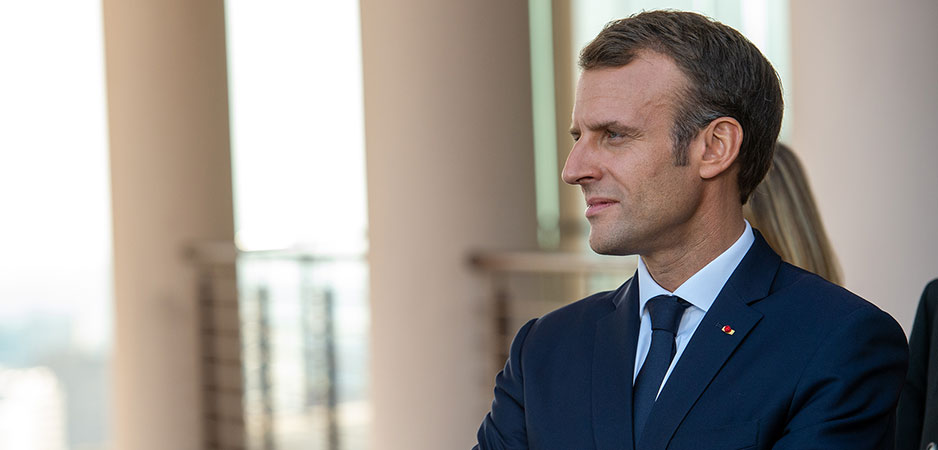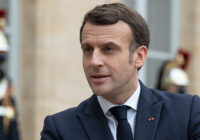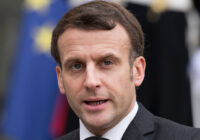In early October, French President Emmanuel Macron, as a preparation for the 2022 election, made the decision to mount a campaign blaming France’s Muslims for their failure to embrace the country’s increasingly dogmatic “Republican culture.” To counter Marine Le Pen’s anti-immigration extreme right, Macron calculated that his shambolic center-right party needed to find a way of steering votes away from the passably racist National Rally led by Le Pen.
In Macron’s eyes, French Muslims have failed to prove the sincerity of their expected conversion to France’s national religion of laicité, or secularism, that has now definitively supplanted the traditional role of the Catholic Church. To outdo Le Pen, he deviated the blame to the world’s entire Muslim population, claiming that Islam was in the thralls of a global crisis that offended French republican sensibilities. Its credo of “equality, liberty, fraternity” now excluded tolerance for any group of people who did not unanimously adopt all its trappings. Fraternity has its limits.
Even before the gruesome assaults on a schoolteacher and three citizens in a church in Nice that horrified the French nation, through his rhetoric about a global Islamic threat, Macron managed to convince a number of governments in Muslim countries that France was at war with their religion. Several nations responded by recommending a boycott of French products.
Emmanuel Macron Defends His Crusade
Some went further. Since Macron felt himself in a position to signal their crisis, some Muslim authorities were tempted to focus on his own. Noticing that the French president was proposing increasingly authoritarian laws that had the effect of targeting Muslim children in schools, Pakistan’s Federal Minister for Human Rights Shireen Mazari penned a tweet comparing Macron’s proposed laws, which included attributing ID numbers to school children, to the Nazi policy of requiring Jews to wear yellow stars.
Mazari initially made the accusation on the basis of an article that was later amended to state that the IDs would be required for all children, not just Muslims. The reform aimed at obliging every child in France to receive civic instruction teaching them the “values of the Republic.” Those values include celebrating the publication of insulting cartoons that may even express bigotry and limiting the freedom to don clothing or symbols that may signify affiliation with a religion other than republicanism. Because France’s values are universal, they trump anyone else’s particular values. Conformity is a core republican value.
France’s Foreign Ministry wasted no time reacting to Mazari’s comparison of the new measures with Nazi practices. NBC News’s headline on the story read: “France ‘deeply shocked’ as Pakistan minister compares Macron to Nazis.”
Today’s Daily Devil’s Dictionary definition:
Deeply shocked:
1. Morally offended
2. Embarrassingly surprised that one has been found out
Contextual Note
In the film “Casablanca,” Captain Renault, the French chief of the local police under German occupation gives the order to shut down Rick’s Café, a nightclub where he spends most of his evenings. When Rick, the American owner of the café played by Humphrey Bogart, asks why, Renault replies “I’m shocked, shocked, to find that gambling is going on here” just as the croupier arrives to give him his winnings.
The French Foreign Ministry didn’t quite frame the message in the same terms as Captain Renault. NBC reports that “the minister spoke in ‘deeply shocking and insulting terms’ of Macron and the whole of France.” The ministry added, “These hateful words are blatant lies, imbued with an ideology of hatred and violence.” Clearly, Mazari had fallen into the trap of Godwin’s law (citing Nazis invalidates any argument) and the ministry jumped on it.
France’s proposed law clearly applies the French anti-discriminatory republican rule that procedures must apply equally and uniformly to everyone. Unlike the policies of the Nazi regime, it doesn’t seek to exclude or eliminate groups of people considered different. Marine Le Pen’s party might be tempted to envisage measures of exclusion, but not France’s traditional parties. Not even Macron’s non-traditional Republic on the Move, which was cobbled together in 2017 by attracting a variety of traditional personalities from the political establishment to provide the president with a majority in parliament.
The republican credo elevates universal civic values to the level of an alternative moral system, replacing all the traditional bases of morality, including the Christian principles of compassion, non-violence and concern for the oppressed. Universality implies uniformity. Individuals must show themselves not so much worthy of their neighbors and their community, but of the republic itself. In that sense, the spirit of the new policies put forward by Macron do vaguely resemble Hitler’s belief in a singular Aryan ideal.
Historical Note
Macron’s vision of la république takes Charles de Gaulle’s meme of aspiring to “a certain idea of France” beyond mere aspiration. Macron seeks to codify and monitor the behavior of individuals, who must now prove their conformity with the civic ideal.
Recently, China’s President Xi Jinping inveighed against a trend that when translated into English is rendered as “splitism.” China is an immense country with a dominant ethnic group, the Han, and the ambition to control territory that includes other ethnicities and cultures. China enjoys the security that comes from governing a population that not only believes in its overwhelming ethnic unity but also, largely as a reaction to its humiliation by Western powers in the 19th century, embraces a fervent form of nationalism. This has permitted Xi in the 21st century to consolidate and reinforce the authoritarianism that Mao Zedong had pushed to a chaotic extreme half a century ago.
Macron’s links his idea of Muslim separatism in France to the entire Muslim world. This curiously echoes Xi’s complaint about “splitism.” The two ideas are fundamentally different, of course, since Xi worries that the cultures and traditions of autonomous regions, such as Tibet or Xinjiang, might lead to movements of political independence. No risk exists in France of a Muslim nation splitting off, whereas in the past, there have been very real threats of Breton, Alsatian or Basque separatism.
Historically, France achieved a sense of national unity by imposing the French language on its linguistically diversified regions. Forcing children whose native language was Breton, Alsatian, Basque or Occitan to think in French and imagine themselves as descendants of the Gauls (who obviously didn’t speak French) led to the virtual disappearance of the regional languages. Macron probably sees this historical reality as a policy that paid off in the end. Why not apply it to another important component of contemporary French demography: Muslims?
Macron is now discovering that there are a number of problems with this approach. Unlike Basques or Bretons, French Muslims are geographically dispersed across the nation. The history of their relations with the French formerly colonialist nation is extremely complex. And the fact that it is their religion rather than their ethnicity or their geographical origin that defines them means that treating them as a coherent group is not just perilous, but impossible, especially if the reasoning is restricted to France itself. An important part of their identity derives from a global community that is also extremely diverse.
This may help to explain why Macron believes that Islam is in a crisis. Someone who has a “certain idea” of France itself expects other nations and groups of people to have a certain idea of themselves. For the universalist republican Macron, anything that isn’t uniform and unified must be in a state of crisis.
By taking on the entire Muslim world, Macron may end up disastrously achieving the goal of unifying Muslims by posing as their common enemy. His policies that now insist on shaping all young Muslims in France into the universalist republican mold is creating rather than resolving tension. For one thing, it inevitably provokes more irrational attacks by unhinged fanatics — and every community has its unhinged fanatics.
Norimitsu Onishi and Constant Méheut writing in The New York Times call the system Macron is putting in place “France’s Dragnet,” a policing campaign that now focuses on Muslim children as young as 10. Teachers have been instructed to denounce children who show signs of thinking differently about the values of the republic. It has already left numerous children “traumatized” and fearful to speak freely in class for fear of being suspected of terrorist intentions. That is how, in the wake of drama surrounding the Charlie Hebdo cartoons, France promotes its republican version of “freedom of expression.”
*[In the age of Oscar Wilde and Mark Twain, another American wit, the journalist Ambrose Bierce, produced a series of satirical definitions of commonly used terms, throwing light on their hidden meanings in real discourse. Bierce eventually collected and published them as a book, The Devil’s Dictionary, in 1911. We have shamelessly appropriated his title in the interest of continuing his wholesome pedagogical effort to enlighten generations of readers of the news. Read more of The Daily Devil’s Dictionary on Fair Observer.]
The views expressed in this article are the author’s own and do not necessarily reflect Fair Observer’s editorial policy.
Support Fair Observer
We rely on your support for our independence, diversity and quality.
For more than 10 years, Fair Observer has been free, fair and independent. No billionaire owns us, no advertisers control us. We are a reader-supported nonprofit. Unlike many other publications, we keep our content free for readers regardless of where they live or whether they can afford to pay. We have no paywalls and no ads.
In the post-truth era of fake news, echo chambers and filter bubbles, we publish a plurality of perspectives from around the world. Anyone can publish with us, but everyone goes through a rigorous editorial process. So, you get fact-checked, well-reasoned content instead of noise.
We publish 2,500+ voices from 90+ countries. We also conduct education and training programs
on subjects ranging from digital media and journalism to writing and critical thinking. This
doesn’t come cheap. Servers, editors, trainers and web developers cost
money.
Please consider supporting us on a regular basis as a recurring donor or a
sustaining member.
Will you support FO’s journalism?
We rely on your support for our independence, diversity and quality.






